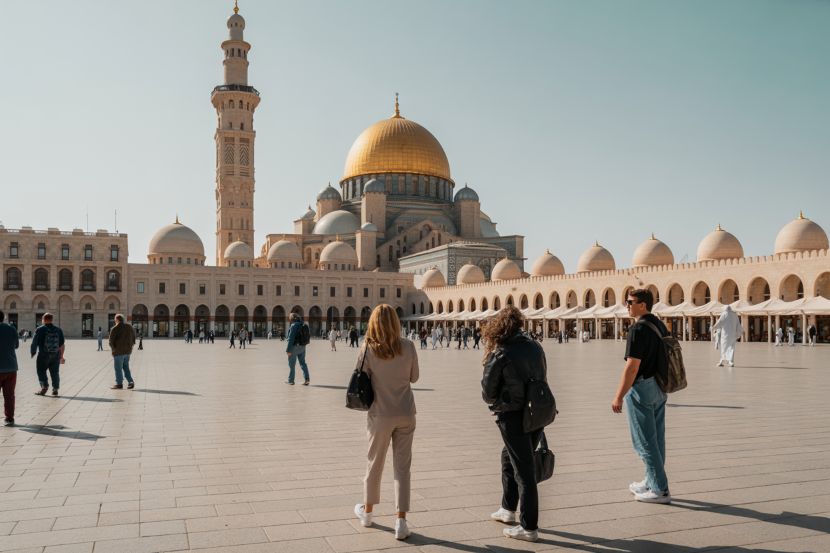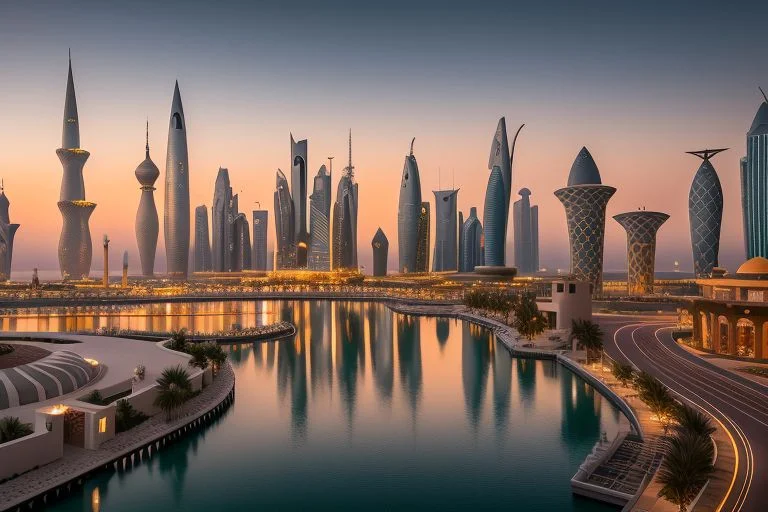The Middle East’s Visionary Leap into Travel Innovation
The Gulf region is setting new global standards for tourism, and at the heart of this transformation are the United Arab Emirates, Saudi Arabia, and Qatar. These nations, known for their ambitious visions and futuristic developments, are now turning their focus toward travel technology to revolutionize the way visitors experience their destinations. With cutting-edge innovations in artificial intelligence, smart airports, digital experiences, and sustainable travel, the three nations are not just adapting to global tourism trends they are defining them.
In recent years, the travel industry has undergone a seismic shift, driven by digital transformation and the demand for seamless, personalized experiences. For the Gulf nations, technology is not just a tool but a catalyst for their grand tourism ambitions. Whether it’s the UAE’s drive toward becoming the world’s most connected hub, Saudi Arabia’s Vision 2030 goals of diversifying its economy through tourism, or Qatar’s ongoing expansion of luxury and cultural travel experiences, the region is preparing for an explosive boom powered by innovation.
UAE: Leading the Charge in Smart Tourism
The United Arab Emirates has long been synonymous with futuristic ambition. From the world’s tallest skyscrapers to AI-powered smart cities, the country’s tourism infrastructure is evolving at an astonishing pace. Now, the UAE is integrating advanced technologies such as artificial intelligence, biometrics, and blockchain into its tourism ecosystem to deliver a truly frictionless travel experience.
Dubai International Airport and Abu Dhabi International Airport are among the first in the world to implement full biometric boarding systems, allowing passengers to pass through immigration and boarding gates using facial recognition alone. This technology drastically reduces waiting times and enhances security, aligning with the UAE’s vision of being the smartest travel hub in the world.
Additionally, the UAE’s tourism boards are investing heavily in digital tourism platforms that offer virtual reality previews of destinations, AI-driven itinerary planning, and immersive digital guides that enhance cultural understanding. Travelers can explore Dubai’s souks or Abu Dhabi’s cultural districts virtually before arrival, creating excitement and familiarity that encourage longer stays and greater spending.
Beyond technology, sustainability is also at the forefront. Smart mobility solutions, like autonomous taxis and electric transport systems, are redefining the way tourists move within the cities. The integration of eco-friendly innovations complements the country’s mission to become a sustainable and inclusive tourism leader by 2031.
Saudi Arabia: Pioneering Tourism Through Digital Transformation
Saudi Arabia’s journey into travel technology is a remarkable story of rapid transformation. Once known primarily for religious tourism, the Kingdom is now expanding its vision to become one of the top global destinations through its Vision 2030 initiative. Technology is the key that unlocks this future.
From the development of NEOM a city designed as a living laboratory for futuristic technologies to the introduction of smart visas and digital hospitality systems, Saudi Arabia is investing in the future of seamless and intelligent tourism. NEOM’s flagship project, “The Line,” represents a vision of travel where mobility, sustainability, and technology are perfectly synchronized. The city promises autonomous transport, zero-carbon systems, and fully AI-integrated services that redefine the meaning of connected travel.
Saudi Arabia’s Ministry of Tourism is also utilizing big data analytics to understand global travel patterns and improve visitor engagement. Advanced AI systems are being used to predict traveler preferences, enhance marketing strategies, and design hyper-personalized experiences that appeal to global tourists.
In addition, the introduction of the eVisa system, allowing visitors from over 60 countries to apply online within minutes, has transformed accessibility. Smart travel infrastructure, including mobile apps that offer real-time navigation, digital concierge services, and multilingual virtual assistants, ensures that travelers feel supported and connected throughout their journey.
What truly stands out is Saudi Arabia’s focus on blending heritage with innovation. Augmented reality tours at historical sites like AlUla and Diriyah allow visitors to experience ancient civilizations in ways that were never before possible. This blend of technology and culture creates a deeply human connection that resonates with modern travelers who seek meaning as much as convenience.

Qatar: Merging Luxury, Culture, and Digital Experiences
Qatar, with its reputation for luxury and cultural sophistication, is embracing travel technology as a means to amplify both. Following its global spotlight from hosting the FIFA World Cup, Qatar has invested in smart infrastructure and innovative travel solutions to sustain its tourism momentum.
Hamad International Airport, recognized as one of the most advanced airports in the world, has implemented AI-driven systems to enhance passenger flow, facial recognition check-ins, and contactless services for greater safety and comfort. These innovations reflect Qatar’s mission to create a travel environment that is both efficient and welcoming.
Qatar Tourism is also experimenting with advanced digital storytelling platforms that allow visitors to explore the country’s rich history and modern lifestyle through immersive digital content. Virtual reality tours of museums, 3D mapping of historical sites, and smart city experiences in Doha provide travelers with an engaging journey that transcends physical boundaries.
Moreover, the country’s hospitality industry is adopting IoT (Internet of Things) and AI-powered tools to provide personalized guest services. Smart hotel rooms that adjust temperature, lighting, and entertainment based on individual preferences are becoming the new norm. Digital concierges available through mobile apps ensure guests have instant access to local experiences, event updates, and dining recommendations all tailored to their interests.
Qatar’s commitment to blending technology with authentic cultural experiences sets it apart. Visitors can attend a traditional Qatari art exhibition and simultaneously use an AR app to learn about the artist’s process in real time. Such innovations don’t just enhance convenience they deepen the emotional connection between travelers and the destination.
The Power of Artificial Intelligence in the Travel Ecosystem
Artificial Intelligence is emerging as the backbone of the Middle East’s tourism revolution. From the UAE’s AI-powered airports to Saudi Arabia’s predictive tourism analytics and Qatar’s smart hospitality systems, AI is creating a unified ecosystem that prioritizes personalization and efficiency.
Travelers today expect journeys that are intuitive, tailored, and stress-free. AI enables tourism boards and private companies to anticipate traveler needs even before arrival. Personalized itineraries, real-time travel updates, and instant language translation tools are becoming standard features across these Gulf destinations.
In the UAE, AI chatbots on tourism websites now provide 24/7 multilingual support, while Saudi Arabia’s data-driven marketing platforms analyze global travel trends to target specific audiences with customized campaigns. Meanwhile, Qatar’s AI systems in hospitality management ensure that visitors enjoy hyper-personalized stays that remember preferences from previous trips.
The integration of AI not only enhances convenience but also strengthens the sense of connection between travelers and destinations. By understanding behavior, preferences, and cultural nuances, these technologies create experiences that feel more human even when driven by machines.
Smart Airports and Seamless Mobility
One of the most visible indicators of technological progress in Gulf tourism is the rapid transformation of airports and mobility systems. The UAE’s airports have long been pioneers in automation, offering biometric gates, smart security checks, and automated baggage systems. Saudi Arabia and Qatar are following suit with significant investments in next-generation airport infrastructure.
Hamad International Airport’s “Smart Airport Vision” focuses on a contactless passenger journey from digital check-in kiosks to biometric boarding gates reducing congestion and enhancing comfort. Similarly, Riyadh’s King Khalid International Airport is integrating smart travel platforms that connect flight information with city-wide transport systems, ensuring a frictionless journey from landing to destination.
Mobility within the cities is also evolving. Autonomous taxis in Dubai, smart buses in Riyadh, and AI-guided transport hubs in Doha are examples of how these countries are reimagining urban movement. The ultimate goal is to make travel faster, safer, and more sustainable ensuring tourists can focus on exploration, not logistics.

Sustainability and Smart Tourism Go Hand in Hand
As these nations embrace rapid technological advancement, sustainability remains a central focus. The Gulf states understand that the future of tourism depends on responsible innovation—balancing growth with environmental preservation.
Saudi Arabia’s NEOM, for instance, is designed to run entirely on renewable energy and aims to be a model for sustainable tourism worldwide. The UAE is promoting eco-tourism through AI-monitored conservation areas that manage visitor impact on natural reserves, while Qatar is implementing smart waste management and energy-efficient systems in its tourism zones.
Digitalization also supports sustainability through smarter planning. AI tools are being used to optimize resource use, predict demand, and reduce waste in the hospitality sector. Travelers can make eco-friendly choices through digital guides that highlight sustainable hotels, local products, and green activities.
This combination of smart technology and sustainability reflects a deeper commitment to global responsibility. By positioning innovation within an environmentally conscious framework, the Gulf nations are not only attracting tourists but also inspiring global admiration.
The Human Side of Technology in Tourism
While technology often takes the spotlight, the human element remains at the heart of the Gulf’s tourism strategy. The ultimate goal is not just efficiency it’s emotion. Travelers come seeking stories, connections, and memories, and technology serves as a bridge to amplify these human experiences.
In Saudi Arabia, AR and VR are being used to tell the stories of ancient civilizations, making heritage come alive for visitors of all ages. In the UAE, digital storytelling and AI-driven cultural apps allow travelers to connect with local traditions in engaging ways. Qatar’s smart platforms encourage cultural dialogue by making its rich history accessible to the digital generation.
Technology here does not replace human warmth it enhances it. By removing logistical barriers and enabling personalized experiences, it allows travelers to focus on what truly matters: discovery, understanding, and connection.
Future Outlook: A Digital Tourism Revolution in the Gulf
The trajectory is clear the UAE, Saudi Arabia, and Qatar are poised to become the epicenters of travel technology innovation. Their governments are investing billions to develop AI-powered tourism ecosystems, smart cities, and sustainable infrastructure. This digital revolution is expected to create millions of jobs, attract international investors, and position the Middle East as a global tourism powerhouse.
In the coming years, travelers can expect a fully interconnected experience where booking, transport, exploration, and cultural engagement flow seamlessly across digital platforms. Virtual reality experiences will complement real-world travel, AI will anticipate traveler needs, and blockchain will ensure transparency in transactions.
As technology continues to evolve, these nations are setting benchmarks for how innovation can coexist with tradition, luxury, and sustainability. The Gulf is no longer just a destination it’s becoming a vision of the future of global tourism.
Conclusion: The Future Is Now
The UAE, Saudi Arabia, and Qatar are redefining what it means to travel in the 21st century. By fusing innovation with hospitality, and technology with human connection, they are creating a new model for global tourism one that is smart, sustainable, and profoundly human.
As travelers step into this new era of intelligent exploration, they will not only witness the future of travel but become part of it. And for the Gulf nations leading this charge, the sky is not the limit it’s just the beginning.
Do follow Gulf Magazine on Instagram.
Also Read – Saudi Delegation Embarks on Transformative US Mission to Boost Tech and AI Collaboration



